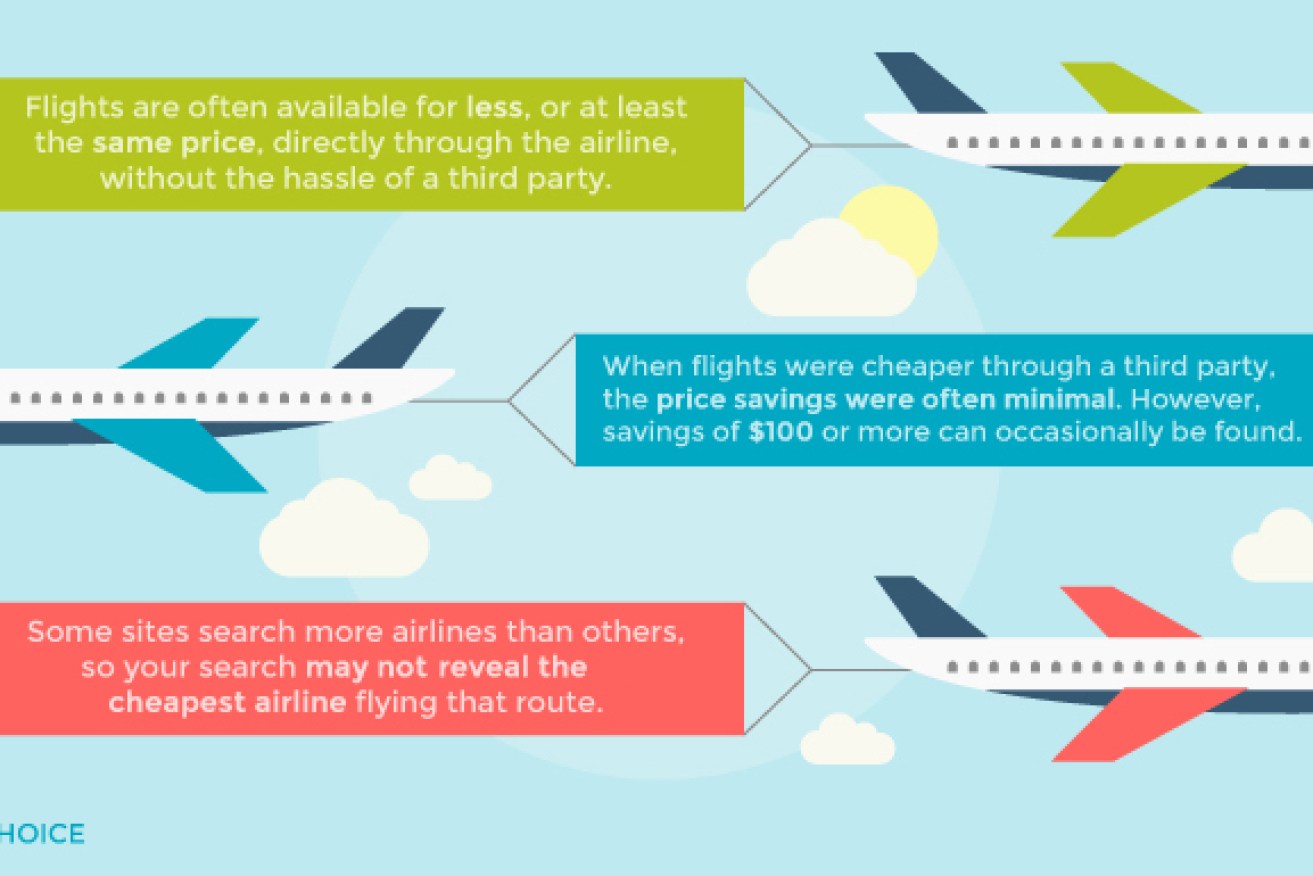The cheap airline ‘trap’ that’s snaring travellers


One would be hard-pressed to find a traveller on Earth who had not, at least once, sought out the assistance of a flight cost comparison website in a time of need.
Those who have will no doubt be familiar with the veritable web of hidden costs and pre-selected extras that consumers are being forced to navigate.
There are hundreds of flight comparison sites and almost all of them promise the best deal the internet can offer – some with such confidence they consider themselves ‘unbeatable’.
• Jetstar and AirAsia’s Bali fare battleground
• Airlines face court over hidden cost claims
• Airfares to drop in 2015
But how is it that these comparison sites can actually offer a cheaper price than the airline? Or, perhaps they can’t and it’s all just hype.
According to a recent investigation by consumer advocacy group CHOICE, the direct approach – and not the use of third-party websites – is the best way for finding the cheapest airfares.
“We found that just relying on those comparison sites to get you the best deal is a real trap,” CHOICE spokesperson Tom Godfrey said.

Going straight to the airline to book your ticket is often the cheapest option.
“There were a significant number of times when that wasn’t the case and it was actually more advantageous – in terms of price – to go direct to the airline.”
His advice is to take the hype with a grain of salt and don’t assume that what the marketing tells you is true.
“Always question what you are being told,” Mr Godfrey said.
“Whether it is comparison sites telling you that they have got the cheapest flights available, or the automatic things you are selected into like insurance, always question it and always read the terms and conditions because impulse purchasing something as complex as insurance can be is a high risk.”
Shop around, look at multiple comparison sites and always check the deals on offer directly from the airlines themselves, CHOICE recommends.
It’s also worth noting that comparison sites don’t always compare the prices of every airline, so having a look around ensures you are covering a large sample.
Mr Godfrey said flight changes can be a “sting in the tail” when booking with comparison sites, with modifications or cancellations seeing consumers pay both the airline and the comparison site.
CHOICE considered these flight comparison websites in its investigation: Zuji, Wotif, eDreams, BYOjet, Bestjet, Helloworld, STATravel, Last minute, Expedia, Webjet, Flight Centre and travel.com.au.
Not-so-optional extras
The cost of the flight is often just the tip of the iceberg when it comes to pricing.
The online ticketing process is full of extras, from seat selection to insurance and even the promise that paying a few additional dollars ensures you fly carbon neutral.
Virgin and Jetstar are currently facing legal action from the ACCC for drip pricing practices – the addition of extra fees and charges on top of the headline price.

Jetstar is facing legal action. Photo: AAP
These options may be pre-selected, with the option to ‘opt out’.
Jetstar alone increases the ticket price for luggage, insurance, seat selection and even charity donations – all of which are automatically selected and need to be manually unchecked.
“When you are going on to buy your ticket, always make sure that the headline price you are advertised can be redeemed,” Mr Godfrey said.
“What we are seeing increasingly is the online checkout is used as a place to cross-sell and upsell you things you don’t necessarily need.
“We are running a campaign against Jetstar at the moment to stop them opting you into things to stop them selling you things you don’t need.”
Quickly! There’s only five seats left!
One prime tactic used by airlines and comparison sites alike usually comes in bold text right next to the dollar figure.
On top of the complexity of navigating flight times, potentially time-consuming stopovers and searching for the right price, is the warning that there is a seat shortage and what you are looking at might sell out – and soon.
But a small number of seats doesn’t always mean you will miss out on that flight altogether.
“What we have found in previous investigations is that a lot of the sites, also the airline sites, tell you there is only a few seats available,” Mr Godfrey said.

Don’t let comparison sites suck you in by telling you there are only a few seats remaining. Photo: Shutterstock
“They often try to use pressure tactics to get you to book immediately.
“What we have found is that that doesn’t mean there are only five seats available on the plane, it means there are only five seats available at that price.”
Don’t be grounded by a scam
Air travel is not immune from the reach of scammers.
In the past, fake booking websites and emails containing forged itineraries or tickets have been reported.
A 2013 scam saw Qantas e-tickets sent via email with a virus attached.
Virgin Australia and Jetstar have also previously reported similar scams.
Using reputable providers and a bit of common sense were the best way to determine if what you are looking at is real or forged, Mr Godfrey said.
“The simple thing you can do is look for contact details where you can directly verify yourself who is behind the sites,” he said.
“If there is no phone number you can call to check and verify then that should be a warning sign.”









